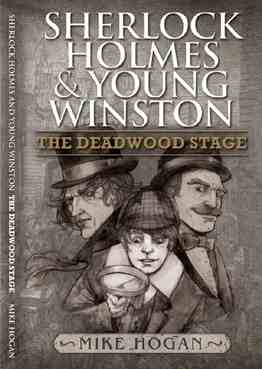Sherlock Holmes and Young Winston: The Deadwood Stage by Mike Hogan (book review)
 |
| Sherlock Holmes and Young Winston: The Deadwood Stage by Mike Hogan |
The Deadwood Stage is the first in a series of books by Mike Hogan that explore a fascinating premise: what if a young Winston Churchill had joined forces with the famous detective duo, Sherlock Holmes and Doctor Watson? The book is a Sherlock Holmes pastiche, which is a small but thriving genre in which modern authors write new Holmes mysteries.
I must admit, when I heard of the idea my first reaction was that it would be too far-fetched. However, as soon as I started reading this fine book I realised that my fears were completely unfounded.
This is a Sherlock Holmes story in the very best sense, almost completely indistinguishable from the originals written by Arthur Conan Doyle. I was particularly impressed by Mike Hogan’s sensitive and intelligent depiction of Holmes himself. The character leaps out of the page, and readers who are familiar with the famous long-running Granada TV series of Sherlock Holmes adaptation will instantly recognise the voice of Jeremy Brett. It’s like bumping into an old friend. The characterisation here really is remarkable and I must stress once again that this is indistinguishable from an original Sherlock Holmes story–while at the same time allowing the author’s own imagination and flare to shine through.
The character of Watson is also excellently portrayed and, if anything, in slightly more depth than we are used to. His role as a man of medicine is explored and there are fascinating insights about the conflicting theories of the day, ie. ‘miasma’ vs. germ theory.
I’m sure you are all keen to hear about Winston Churchill’s role in the book! In 1887, he is twelve years old and far more intelligent than his parents believe (they worry that he is backward). He falls in with Holmes and Watson as they work on their latest case, and soon proves himself an adept pupil of the science of deduction. The relationships between Holmes, Watson and Churchill are very interesting to watch as they unfold: in some respects, Churchill becomes a more valuable companion to the great detective than Watson, who feels a little left out. It’s a testament to the skill of the author that the character of Winston Churchill is compelling, believable, and well-rounded. His presence in the book certainly is not a gimmick; he is vital to the plot.
The plot itself is a classic Holmes mystery, with murderers, falsely accused damsels, carriage chases, humour, and of course knotty problems solved by the science of deduction. Several historical figures play cameo roles, notably Oscar Wilde and Buffalo Bill. Like the original Holmes mysteries it isn’t an easy read: the interplay of subterfuge and deduction requires concentration, and I’m not 100% sure I followed one of the threads correctly. To me it seemed that the Miss Caspar subplot had only loose connections with the main plot, but that may have been because I wasn’t paying enough attention! Alternatively it may be of importance in the future books of the series.
The author is obviously at home with the period and the story immerses us in the sights, sounds and smells of Victorian London. Period details were everywhere and really added to the overall sense of authenticity. However, it certainly isn’t a slow-paced novel and the focus is always on action and dialogue, not heavy description.
Overall the novel was brilliant fun and should be required reading for any fan of the original stories. Bravo to Mike Hogan for creating an authentic and gripping Sherlock Holmes novel, and I can’t wait to read the other volumes in the series.
Alex Roddie Newsletter
Subscribe here to receive my occasional personal newsletter in your inbox. (For the fun stuff, please consider subscribing to Alpenglow Journal instead!)



